新教材六年级上册Unit3复习课件
六年级英语上册Unit-3课件

Ask and answer:
Where’s your ……? It’s …… It isn’t there now.
它现在不Байду номын сангаас这儿了
It was there a moment ago.
它刚刚还在这儿的。
Ask and answer:
A: Where is your______________? B: It’s ________________. A: It isn’t there now. B: It was there a moment ago.
signs
Unit 3 It was there!
Review Words Guess Sentences
Drill Homework
on
in
大家有疑问的,可以询问和交流
可 以 互 相 讨 论下, 但要小 声点
near
behind
under
on
in
near
behind
under
Look and say:
Listen, tick and circle
Su Hai is looking for (寻找) the CD Walkman, Where’s the CD Walkman? Listen---
Homework:
1.Copy the words each a line. 2.Make the dialogues about the pictures. (P25 ①②③⑤) 3.Read Part B,C in Unit3. (thirty minutes)
Where’s the dog? It’s ……
under the table near the lamp on the book
人教版六年级英语上册Unit_3_Atalk_设计

人教版六年级英语上册Unit 3 My weekend plan(A Let’s try Let’s talk)教学设计PEP Book7 Unit3 My weekend plan教材版本:人教版义务教育教科书六年级上册一、教学目标1. 能够掌握四会句子:What are you going to do tomorrow? I’m going to have an art lesson. We’re going to draw some pictures in Renmin Park.(幻灯片2)2. 能够独立完成Let’s try部分的练习。
(幻灯片4)3. 能够表述自己准备在将来的某个时间里干某事。
二、教学重点、难点1. 掌握四会句子What are you going to do tomorrow? I’m going to lesson. We’ re going to draw some Renmin Park.2. 运用be going to do句型描述自己的活动计划,并与他人进行交流。
三、教法与学法引导法,点拨法,小组合作法。
四、教学过程Step 1 :Warm-up利用Let’s chant复习上节课学习的词汇,进入课堂。
Step 2: PresentationLet’s tryT: It’s Saturday morning. Sarah is on the phone with Mike. Let’s listen to what they are going to do.教师先让学生看问题,画出关键词,然后播放Let’s try部分的录音,学生选择正确答案,并从听觉上进一步感知课时话题。
Let’s talk1. 教师出示图片,与学生进行如下问答:T: Look at the picture , What are they doing?S: have an art lesson.T: What are they going to do tomorrow ?S:They are going to have an art lesson tomorrow.教师引导学生回答have an art lesson. 然后板书并教读单词:tomorrow.教师指着图片问学生:What are you going to do tomorrow? 板书并教读句子:What are you going to do tomorrow? 同时教师适当讲述一般将来时的语法:一般将来时表示将来某一时刻将要发生的动作、行为或存在的状态,或将来某一段时间内经常发生的动作或状态;一般将来时的句子结构:be going to+动词原形可采用如下方式操练:T: be going to doS: be going to doT: What are you going to do?S: What are you going to do?T: What are you going to do tomorrow?S: What are you going to do tomorrow?2. 教师拿着画板,问:What are you going to do tomorrow? 引导学生回答:I’m going to have an art lesson.板书并教读句子:I’m going to have an art lesson.可采用男生问女生答再交换的形式练习句型。
北京版一年级起点六年级上册英语《UNIT THREE HOW DID YOU GO TO HANGZHOU》(一等奖课件) (1)
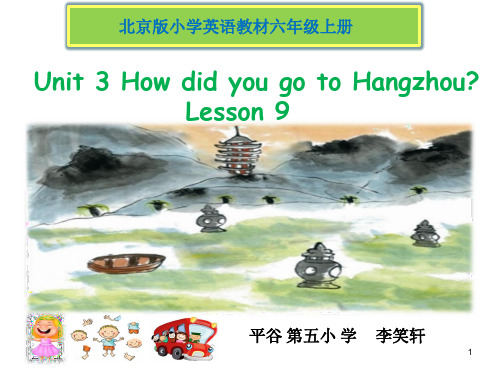
What important(重要的)things will you bring with you when you take a trip?
18
Do you have some advice(建议)for Mike ?
He should take good care o 3 How did you go to Hangzhou? Lesson 9
平谷 第五小 学 李笑轩
1
Everybody! Look at me! I work hard like a bee.
I’m Leena from a school. I say Leena, you say Cool! Leena, Cool! Leena , Cool!
Leena, Cool! I have many hobbies. Eating is one of these.
I like eating fruits, cakes,pizzas,and vegetables.
I like doing sports. swimming, running and tennis.
I like __________(food/sports...) I like___________. I think that is the best!
the National day holiday
Susan
国庆节去了很多地方,玩的很happy!
Peter
国庆节去爬山,去故宫参观,充实而愉快!
He should be more careful.
……
Retell the story
flew to Hangzhou.
took take the train to Hangzhou.
人教版新课标PEP小学英语六年级上册Unit3-PartA说课稿
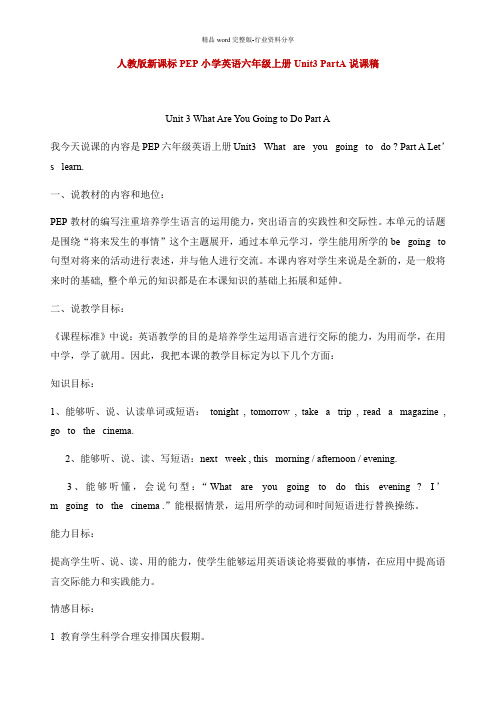
人教版新课标PEP小学英语六年级上册Unit3 PartA说课稿Unit 3 What Are You Going to Do Part A我今天说课的内容是PEP六年级英语上册Unit3What are you going to do ? Part A Let’s learn.一、说教材的内容和地位:PEP教材的编写注重培养学生语言的运用能力,突出语言的实践性和交际性。
本单元的话题是围绕“将来发生的事情”这个主题展开,通过本单元学习,学生能用所学的be going to 句型对将来的活动进行表述,并与他人进行交流。
本课内容对学生来说是全新的,是一般将来时的基础, 整个单元的知识都是在本课知识的基础上拓展和延伸。
二、说教学目标:《课程标准》中说:英语教学的目的是培养学生运用语言进行交际的能力,为用而学,在用中学,学了就用。
因此,我把本课的教学目标定为以下几个方面:知识目标:1、能够听、说、认读单词或短语:tonight , tomorrow , take a trip , read a magazine , go to the cinema.2、能够听、说、读、写短语:next week , this morning / afternoon / evening.3、能够听懂,会说句型:“What are you going to do this evening ?I’m going to the cinema .”能根据情景,运用所学的动词和时间短语进行替换操练。
能力目标:提高学生听、说、读、用的能力,使学生能够运用英语谈论将要做的事情,在应用中提高语言交际能力和实践能力。
情感目标:1 教育学生科学合理安排国庆假期。
2 培养学生爱读书多看有益杂志的好习惯。
教学重点:能听、说、读、写Let’s learn 部分的四会短语,正确运用此句型“What are you going to do this evening ?I’m going to the cinema .”与他人进行交流。
人教pep六年级上册英语《Unit3MyweekendplanPartCStorytime》说课稿

人教pep六年级上册英语《Unit 3 My weekend plan Part C Story time》说课稿一. 教材分析《人教pep六年级上册英语》第三单元“我的周末计划”部分C故事时间是本节课的主要内容。
这部分主要通过一个关于周末计划的故事,让学生理解和掌握一般将来时的用法,以及如何描述自己的周末计划。
教材内容丰富,贴近学生生活,能够激发学生的学习兴趣,培养学生的语言运用能力。
二. 学情分析六年级的学生已经掌握了英语学习的基本语法和词汇,具备一定的听说读写能力。
他们对一般将来时的概念有一定的了解,但可能在实际运用中还存在一定的困难。
因此,在教学过程中,我将以学生为主体,注重培养他们的语言实践能力,帮助他们更好地理解和运用一般将来时。
三. 说教学目标1.知识目标:让学生掌握一般将来时的基本结构“will + 动词原形”,并能够运用所学知识描述自己的周末计划。
2.能力目标:通过听、说、读、写等多种教学活动,提高学生的语言运用能力,使他们在实际情境中能够熟练地运用一般将来时进行交流。
3.情感目标:培养学生对英语学习的兴趣,使他们更加热爱英语,乐于用英语进行交流。
四. 说教学重难点1.重点:一般将来时的用法,包括结构“will + 动词原形”和关键短语“goto the zoo”、“go to the movies”等。
2.难点:在实际情境中灵活运用一般将来时进行交流,以及如何正确使用一般将来时描述未来的计划。
五. 说教学方法与手段1.采用任务型教学法,通过设定各种真实情境,让学生在完成任务的过程中运用所学知识。
2.运用多媒体教学手段,如课件、视频等,为学生提供丰富的视觉、听觉资源,提高他们的学习兴趣。
3.分组合作学习,鼓励学生相互交流、合作,共同完成学习任务。
4.采用激励性评价,关注学生的个体差异,及时给予表扬和鼓励,提高他们的自信心。
六. 说教学过程1.导入:通过提问学生关于周末的计划,引出本节课的主题,激发学生的学习兴趣。
2024年译林版英语六年级上册全册精彩课件【完整版】

2024年译林版英语六年级上册全册精彩课件【完整版】一、教学内容本课件依据2024年译林版英语六年级上册全册教材,详细内容包括:1. 教材章节:Unit 1Unit 6,涵盖各单元的A、B部分;2. 详细内容:重点词汇、语法、日常用语、阅读理解、写作技巧等。
二、教学目标1. 掌握并运用各单元的重点词汇和语法;3. 增进学生对英语文化的了解,激发学习英语的兴趣。
三、教学难点与重点1. 教学难点:时态语法的运用、阅读理解的提高、写作技巧的掌握;2. 教学重点:词汇的积累、日常用语的熟练运用、听说读写能力的提升。
四、教具与学具准备1. 教具:PPT课件、教学光盘、实物、卡片等;2. 学具:课本、练习册、笔记本、彩色笔等。
五、教学过程1. 导入:通过实践情景引入,激发学生的学习兴趣;2. 新课内容:讲解重点词汇、语法、日常用语等,结合例题进行讲解;3. 随堂练习:设计相关练习题,巩固所学知识;4. 互动环节:小组讨论、角色扮演等,提高学生的听说能力;6. 作业布置:布置适量作业,巩固所学知识。
六、板书设计1. 重点词汇:用不同颜色标注,突出重点;2. 语法:用简洁明了的例子展示;3. 阅读理解:列出文章框架,标注关键信息;4. 写作技巧:给出写作模板,指导学生运用。
七、作业设计1. 作业题目:a. 单词拼写:根据课文内容,拼写重点词汇;b. 句子翻译:将课文中的重点句子翻译成中文;c. 阅读理解:完成一篇与课文相关的阅读理解题;d. 写作练习:根据模板,完成一篇短文写作。
答案:略。
八、课后反思及拓展延伸1. 反思:对本节课的教学效果进行自我评价,找出不足之处,以便改进;2. 拓展延伸:推荐相关英语学习资料,鼓励学生自主学习,提高英语水平。
本课件以严谨的用词、流畅的段落衔接,结合实践情景引入、例题讲解、随堂练习等环节,旨在帮助学生在轻松愉快的氛围中学习英语,提高英语素养。
重点和难点解析1. 教学内容的详细规划和组织;2. 教学目标的明确和具体化;3. 教学难点与重点的识别;4. 教具与学具的准备与应用;5. 教学过程中的互动和实践活动设计;6. 板书设计的逻辑性和清晰度;7. 作业设计的针对性和拓展性;8. 课后反思与拓展延伸的实际操作。
【单元热点难点】译林版(三起)英语六年级上册Unit 3 Holiday fun 教材重点(含解析)
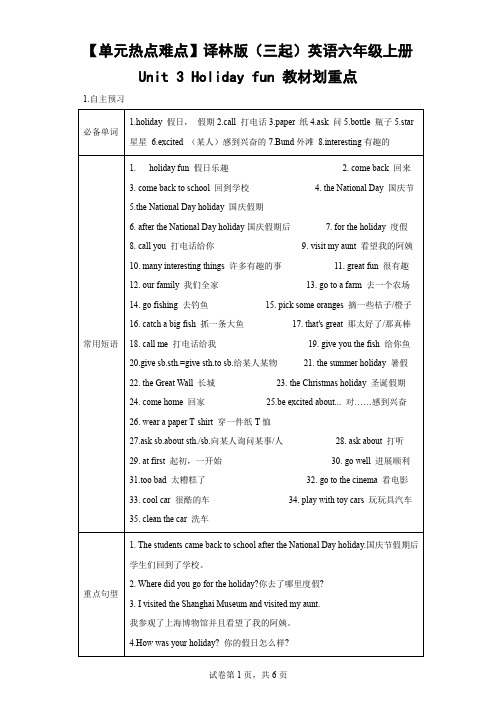
【单元热点难点】译林版(三起)英语六年级上册Unit 3 Holiday fun 教材划重点1.自主预习2. 词句展播01.Holiday fun.节日乐趣(教材p26)1) holiday n.假日,假期复数: holidays 短语:on holiday 度假易混辨析如:Saturday is a holiday , and most people do not work. 周六是一个假日,大部分人不上班。
Summer holidays , winter holidays , National Day holiday 暑假,寒假,国庆节假期Spring festival , school art festival.春节,学校艺术节02. The students came back to school after the National Day holiday.学生们在国庆假期结束后又回到了学校。
(教材p26)come back to+地点返回某地,如:come back to the park 回到公园。
但是后接home,here,there等副词,则不加介词to 如:come back home 回到家03. I called you, but you weren't at home.我给你打了电话,但你不在家。
(教材p26)call v. 称呼; 打电话;n.通话;喊叫如:If you have any question, you can call me. 如果你有任何问题,你可以打电话给我。
拓展:call me Tina叫我蒂娜make a phone call 打电话04.I saw many interesting things.我看到了很多有趣的事情。
(教材p26)interesting 形容词,意思是“有趣的”通常放在名词前或者物+be+interesting 如:an interesting story 一个有趣的故事/The story is interesting. 故事是有趣的。
人教版六年级上册英语《Unit3PartALet'slearn-Makeaplan(2)》说课稿

人教版六年级上册英语《Unit 3 Part A Let’s learn-Make a plan (2)》说课稿一. 教材分析《Unit 3 Part A Let’s learn-Make a plan (2)》是人教版六年级上册英语教材的一篇文章。
本节课主要围绕着制定计划这一主题展开,通过描述不同的人物和他们的计划,让学生学会如何用英语表达自己的计划。
本节课的内容与学生的生活紧密相连,有利于激发学生的学习兴趣和积极性。
二. 学情分析六年级的学生已经具备了一定的英语基础,能够听懂并运用简单的英语进行日常交流。
但是,他们在英语写作和口语表达方面还存在一定的困难。
因此,在教学过程中,需要注重培养学生的听、说、读、写能力,使他们能够更好地理解和运用英语。
三. 说教学目标1.知识目标:学生能够听懂、说出一般现在时态的句子,并能够用英语描述自己的计划。
2.能力目标:学生能够通过听力、口语、阅读和写作等多种方式,运用英语进行交流和表达。
3.情感目标:培养学生热爱生活、积极规划时间的良好习惯。
四. 说教学重难点1.教学重点:一般现在时态的运用,学生能够用英语描述自己的计划。
2.教学难点:如何引导学生正确运用一般现在时态,以及如何灵活运用词汇和句型进行表达。
五. 说教学方法与手段1.情景教学法:通过设定情境,让学生在实际语境中学习英语,提高学生的学习兴趣和积极性。
2.任务型教学法:通过完成各种任务,培养学生运用英语进行实际交流的能力。
3.合作学习法:引导学生进行小组讨论和合作,提高学生的团队协作能力和口语表达能力。
4.多媒体教学手段:利用多媒体课件、图片、视频等资源,丰富教学内容,提高学生的学习兴趣。
六. 说教学过程1.导入:通过提问学生周末的计划,引出本节课的主题,激发学生的学习兴趣。
2.呈现:展示图片和视频,让学生了解不同的人物和他们的计划。
3.新课导入:讲解一般现在时态的用法,引导学生学会用英语描述自己的计划。
人教版六年级英语上册第三单元课件PPT
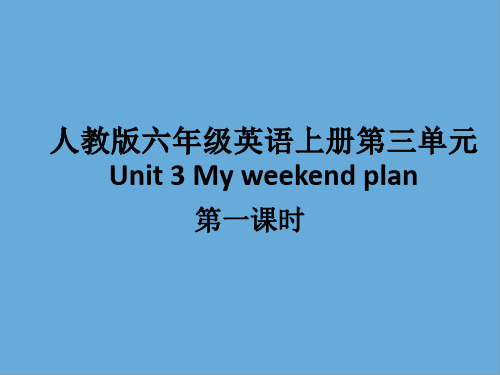
Unit 3 My weekend plan
第三课时
take a trip
see a film
visit my grandparents
go to the supermarket
Make a report
• If today is Saturday, what is your father or mother going to do? —My father is going to the park this morning. He is going to …. —My mother is going to …
Christmas Day
What food do you usually eat that day? We usually eat mooncakes.
Do you want to know what I usually do on Mid-Autumn Festival?
My family are going to get together and have a big dinner.
p__st c__ __d
名词单数变复数
• 一般情况,在词尾加-s,如: apples, monkeys
• 以s,x,sh,ch,结尾的单词,加-es,如: boxes, watches
• 以辅音加y结尾的单词,变y为i加-es,如 dictionary—dictionaries
Role-play
What are you going to do this evening?
What are you going to do this morning / afternoon/ evening/ tonight/ tomorrow/ next week?
小学英语人教PEP新版六年级上册Unit3read and write
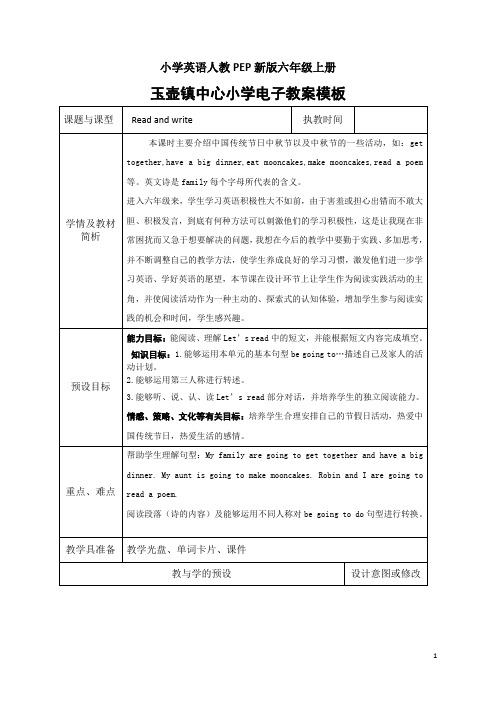
What is Wu Yifan’s grandma going to do on Mid-Autumn Festival?
What are Robin and Wu Yifan going to do on Mid-Autumn Festival?
2.师让学生问自己,Can you ask me ? Ss: What are you going to do on Mid-Autumn Festival? T: I’m going to make mooncakes.引出动词词组 make mooncakes.解释其意,并教读。
3.师指向本班最喜欢古诗的同学,问: What are you going to do on Mid-Autumn Festival? 引导他回答 I’m going to read a poem.引出新词组 read a poem,解释其意并教读。
Step 3:while reading
1. General reading略读:
T:总结In China , we are going to get together and have a big dinner on Mid-Autumn Festival . And I’m going to make mooncakes. What about Wu Yifan and his family ? Turn to page 28. Read Wu Yifan and his family’s Mid-Autumn Festival, let’s read the text quickly andthink it over:
PEP新教材人教新版小学英语六年级上册Unit 3 Let's check P30
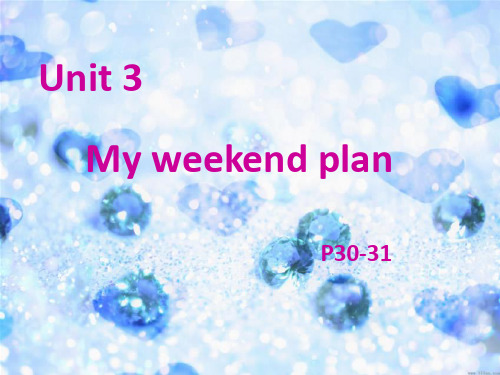
word book
dictionary
comic book
newspaper
post card
post card
dictionary
word book
newspaper comic book
16
pots darc post card koob cocmi comic book pitalhos hospital
A: What are you going to buy?
this evening
shoe store a pair of shoes
Amy: Where is she going …?
Chen: She is going to the …. Amy: What is she going to buy ?
narydiction dictionary sperpanew newspaper
drow koob word book
What are you going to buy ?
I am going to buy...
a word book a newspaper a post card
a dictionary a comic book
意义是“什么”,要根据问的内容 来回答。 如:what’s your name? my name is XXX. 意义是“哪里”,具体回答地点那 里。 如:where is your school? My school is near the post office. 意义是“什么时候”,具体回答 时间 。 如:when are you going to school tomorrow? I’m going to school at 7:00.
人教版六年级上册英语《Unit3PartBReadandwrite(2)》说课稿
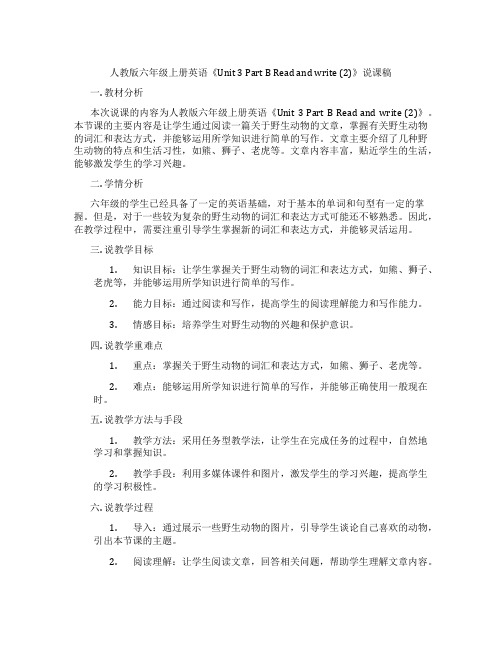
人教版六年级上册英语《Unit 3 Part B Read and write (2)》说课稿一. 教材分析本次说课的内容为人教版六年级上册英语《Unit 3 Part B Read and write (2)》。
本节课的主要内容是让学生通过阅读一篇关于野生动物的文章,掌握有关野生动物的词汇和表达方式,并能够运用所学知识进行简单的写作。
文章主要介绍了几种野生动物的特点和生活习性,如熊、狮子、老虎等。
文章内容丰富,贴近学生的生活,能够激发学生的学习兴趣。
二. 学情分析六年级的学生已经具备了一定的英语基础,对于基本的单词和句型有一定的掌握。
但是,对于一些较为复杂的野生动物的词汇和表达方式可能还不够熟悉。
因此,在教学过程中,需要注重引导学生掌握新的词汇和表达方式,并能够灵活运用。
三. 说教学目标1.知识目标:让学生掌握关于野生动物的词汇和表达方式,如熊、狮子、老虎等,并能够运用所学知识进行简单的写作。
2.能力目标:通过阅读和写作,提高学生的阅读理解能力和写作能力。
3.情感目标:培养学生对野生动物的兴趣和保护意识。
四. 说教学重难点1.重点:掌握关于野生动物的词汇和表达方式,如熊、狮子、老虎等。
2.难点:能够运用所学知识进行简单的写作,并能够正确使用一般现在时。
五. 说教学方法与手段1.教学方法:采用任务型教学法,让学生在完成任务的过程中,自然地学习和掌握知识。
2.教学手段:利用多媒体课件和图片,激发学生的学习兴趣,提高学生的学习积极性。
六. 说教学过程1.导入:通过展示一些野生动物的图片,引导学生谈论自己喜欢的动物,引出本节课的主题。
2.阅读理解:让学生阅读文章,回答相关问题,帮助学生理解文章内容。
3.新课呈现:通过讲解和练习,让学生掌握关于野生动物的词汇和表达方式。
4.写作练习:让学生根据所学知识,写一篇关于自己喜欢的动物的短文。
5.总结:对学生的写作进行评价和反馈,总结本节课所学内容。
七. 说板书设计板书设计要简洁明了,能够突出本节课的主要内容和知识点。
Unit3MyweekendplanPartBLet'slearn(教案)人教PEP版英语六年级上册
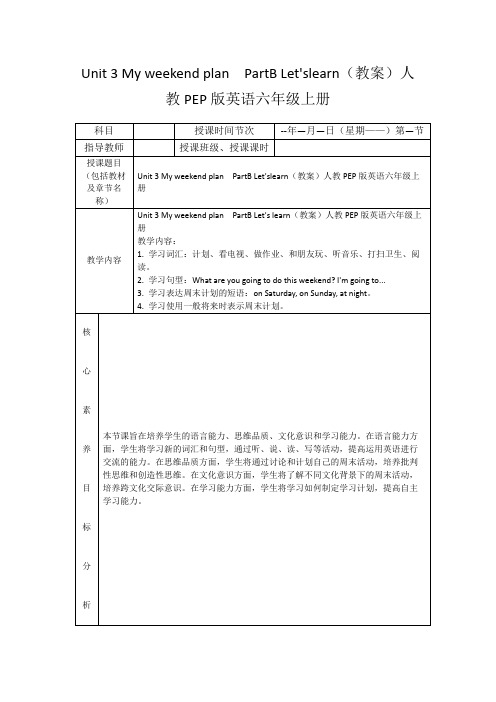
示例:What are you going to do this weekend?(你这个周末打算做什么?)
5.请用本节课所学的词汇和句型,编写一个关于和朋友一起度过周末的句子,并画出相应的插图。
示例:My friend and I are going to play basketball together this weekend.(这个周末,我和我的朋友要一起打篮球。)
介绍与本节课内容相关的拓展知识,拓宽学生的知识视野。
引导学生关注学科前沿动态,培养学生的创新意识和探索精神。
情感升华:
结合本节课内容,引导学生思考学科与生活的联系,培养学生的社会责任感。
鼓励学生分享学习本节课的心得和体会,增进师生之间的情感交流。
(六)课堂小结(预计用时:2分钟)
简要回顾本节课学习的知识点,强调本节课的重点和难点。
3.学习表达周末计划的短语:on Saturday, on Sunday, at night。
4.学习使用一般将来时表示周末计划。
核心素养目标分析
本节课旨在培养学生的语言能力、思维品质、文化意识和学习能力。在语言能力方面,学生将学习新的词汇和句型,通过听、说、读、写等活动,提高运用英语进行交流的能力。在思维品质方面,学生将通过讨论和计划自己的周末活动,培养批判性思维和创造性思维。在文化意识方面,学生将了解不同文化背景下的周末活动,培养跨文化交际意识。在学习能力方面,学生将学习如何制定学习计划,提高自主学习能力。
⑤一般将来时态:以简洁的图示或例句展示一般将来时态的使用方法,如“I'm going to clean my room this weekend.”。
PEP新教材人教新版小学英语六年级上册Unit 3 B Let's talkP26
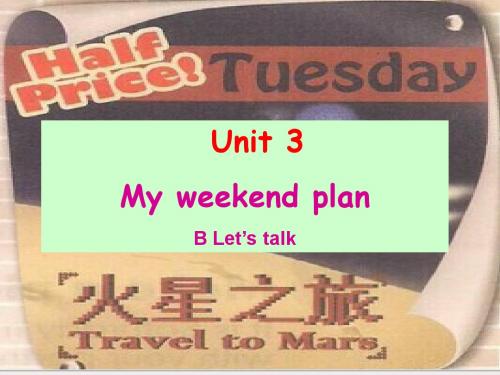
What are you going to do tomorrow night? 3._________________________________? I’m going to watch a movie tomorrow night.
4._________________________________? Tom is going to have a trip this winter holiday.
地点类
bookstore kitchen / bathroom /..
Who are they?
John is on his way home. He meets Amy. What is Amy going to do? Can you guess?
Let’s try
1. What is Amy going to do?
Next Week, John and Jack are going to the cinema. They are going to see a film about space travel. They are going there next Wednesday. Amy tells John to go on Tuesday. Because it’s half price then. They will have fun there.
When are you going, John?
Next Wednesday.
Why not go on Tuesday?
It’s half price then.
$100 X 1/2 =$50
Group work
Act the dialogue in role.
- 1、下载文档前请自行甄别文档内容的完整性,平台不提供额外的编辑、内容补充、找答案等附加服务。
- 2、"仅部分预览"的文档,不可在线预览部分如存在完整性等问题,可反馈申请退款(可完整预览的文档不适用该条件!)。
- 3、如文档侵犯您的权益,请联系客服反馈,我们会尽快为您处理(人工客服工作时间:9:00-18:30)。
What’s missing?
visit my grandparents next weekend next week
visit my grandparents
see a film
take a trip
go to the supermarket
who where when how what Whereare you going on National Holiday ? 1._____ ---To Hainan. When are you going to Shanghai ? 2. ______ ---Next Monday. 3.--______ Who are you going with ? --With my parents. How 4.--______are you going to Beijing ?--By plane. 5.-_____ What are you going to do this evening ? --I’m going to watch TV.
visit grandparents
see a film 看电影 go to the cinema to see a film
take a trip
去旅行
go to the supermarket
去超市
go to the supermarket take a trip this afternoon
Let's have a competition in pairs
A: What are you going to do tomorrow/this morning / tonight / next week /...? B: I'm going to ... .
fly kites
do homework
1、这五个词是特殊疑问词, 2、特殊疑问词要根据问的内容做具体回答。
What Where
意思是“什么”,要根据问的内容来回答。 如:what’s your name? my name is XXX. 意思是“哪里”,具体回答地点那里 。 如:where is your school? My school is near the post office. 意思是“什么时候”,具体回答时间 。 如:when are you going to school tomorrow? I’m going to school at 7:00. 意思是“谁”,具体回答人 。 如:Who are you going with? I’m going with Amy. 意思是“交通方式”,具体回答交通方式。 如:How are you going? I’m going on foot.
一般将来时态(be going to)
小结: What +be+人 +going to do +时间. 人+be +going to +动词短语+时间. 问句和答语的be动词保持一致,is对is, are对are. 问句和答语的主人一一对应,you问I 答, I问you答,男单用he,女单用she,复数用 they.
next tomorrow afternoon week ? tonight ____________ What are you going to dothis I am going to visit my grandparents.
I am going to take a trip.
I am going to see a film. I am going to the supermarket.
supermarket/this evening (by bike) A: What are you going to do… B: I’m going to …
zoo / tomorrow (by subway)
A: Is it far?
B: Yes/No, so I’m going… A:Have a good time!/Sounds great.
When
Who
How
一般将来时:be going to
问句:What头,to do尾。 Who和with 连一起。 Where,When,How,没负担。
答语:What提问,用动短, Where提问,地方来。 When提问,有时间。 Who提问,人来答, How提问,交通方式来回答。
用适当的疑问词 填空
word book
dictionary
comic book
newspaper
What are you going to buy?
post card
I am going to buy a/an.....
visit my grandparents/ tomorrow
tomorrow What are you going to do___________?
I am going to visit my grandparents.
What is Chenjie going to do tomorrow?
draw pictures
tomorrow
She is going to draw pictures.
clean my room/ tonight
What is Zhangpeng going to do tonight? He is going to clean the room.
write an e-mial clean the room water the flowers
fly kites
plant trees have English class
catch butterflies have a picnic
watch TV
go shopping
climb mountains
go ice-skating this weekend What are they going to do this weekend?
They are going to go ice-skating.
play chess this afternoon
What are the boys going to do this afternoon? They are going to plaine
climb mountains cook dinner do the dishes go to the cinema
Do you often go to the bookstore?
What books can you buy in a bookstore What are you going?to do in the bookstore ?
